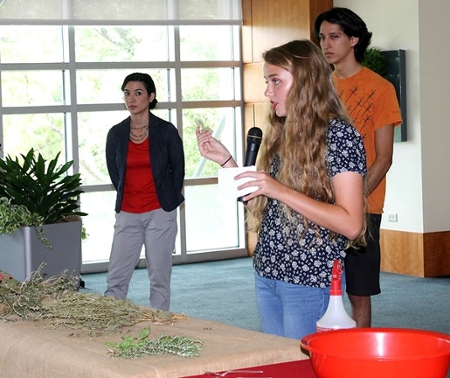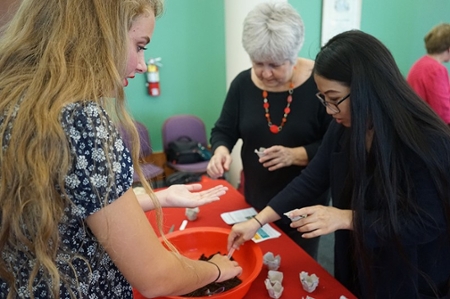 Representatives from the University of Houston Office of Sustainability discussed urban gardening at a Wellness Lunch and Learn hosted by UH Human Resources.
Representatives from the University of Houston Office of Sustainability discussed urban gardening at a Wellness Lunch and Learn hosted by UH Human Resources.
Sustainability Coordinator Melissa Halstead, Office and Team Lead Nikhil Schneider and Garden Assistant Alex Rogers talked about urban and community gardening at the Aug. 23 event. They provided tips on how people could set up their own container gardens at home, and they discussed some of the benefits of having and working in a community garden.
“Community gardens give children and adults the opportunity to learn about all the different factors that affect production of food, both in gardens and on farms. They also give a lot of people access to fresh fruits and vegetables that have not been treated with potentially damaging fertilizers or pesticides,” said Schneider. “Also, some students have found that community gardens can actually increase social connections in certain neighborhoods and, ultimately, it can lead to decreased violence in communities.”
The team also talked about the University’s own Campus Community Garden, located near Cougar Woods Dining Hall. Produce from the garden is donated directly to local food pantries and facilities serving low-income families and individuals. The garden is maintained by the Office of Sustainability and volunteers using only organic gardening methods, as opposed to pesticides and chemical fertilizers. Some of their organic pest control methods include using egg shell barriers to deter snails and slugs, cinnamon to deter moths and stinkbugs, and coffee grounds and mint to deter ants. The team also regularly consults with its partners at Urban Harvest for organic gardening techniques.
“The reason why we have an organic garden is for both environmental and health benefits. We use natural fertilizers and chemical-free food that we get from our compost, which we create on site,” said Halstead. “We also use other natural organic matter to preserve the nutrients and enhance the soil.”
 For beginners hoping to create their own organic gardens at home, the team recommended starting with herbs. To make herbs last longer, particularly during the winter season, the team recommended drying herbs and storing them in a jar or other food storage container.
For beginners hoping to create their own organic gardens at home, the team recommended starting with herbs. To make herbs last longer, particularly during the winter season, the team recommended drying herbs and storing them in a jar or other food storage container.
“For beginner gardeners, herbs are one of the best things to start with because they grow readily in a container garden and they’re pretty hard to kill,” said Schneider. “Learning to incorporate herbs into your cooking will also lead to a healthier lifestyle because you’ll learn to add flavors to your food without adding salt. So you’ll reduce your sodium intake.”
At the end of the session, the team performed a seeding demonstration. They planted oregano and parsley seeds in small pods made from egg cartons and invited the audience to participate. Guests could take the seed pods home with them to begin their own gardens. The team also took questions from the audience during the demo.
The event was the second of a series of Wellness Lunch and Learns taking place throughout the fall semester, hosted by UH Human Resources as part of its POWER UP wellness initiative. The brown bag lunch sessions occur from noon to 12:45 p.m. in the Elizabeth D. Rockwell Pavilion on the second floor of the M.D. Anderson Library. A full list of session dates and topics is available on the POWER UP wellness website.
Tips and information about organic gardening and community gardens are available at urbanharvest.org, or visit the Office of Sustainability’s Urban Gardening Workshop board on Pinterest.
To learn more about the Campus Community Garden and volunteer opportunities, call 832-842-9051, email gardening@uh.edu or visit the garden’s Facebook page.